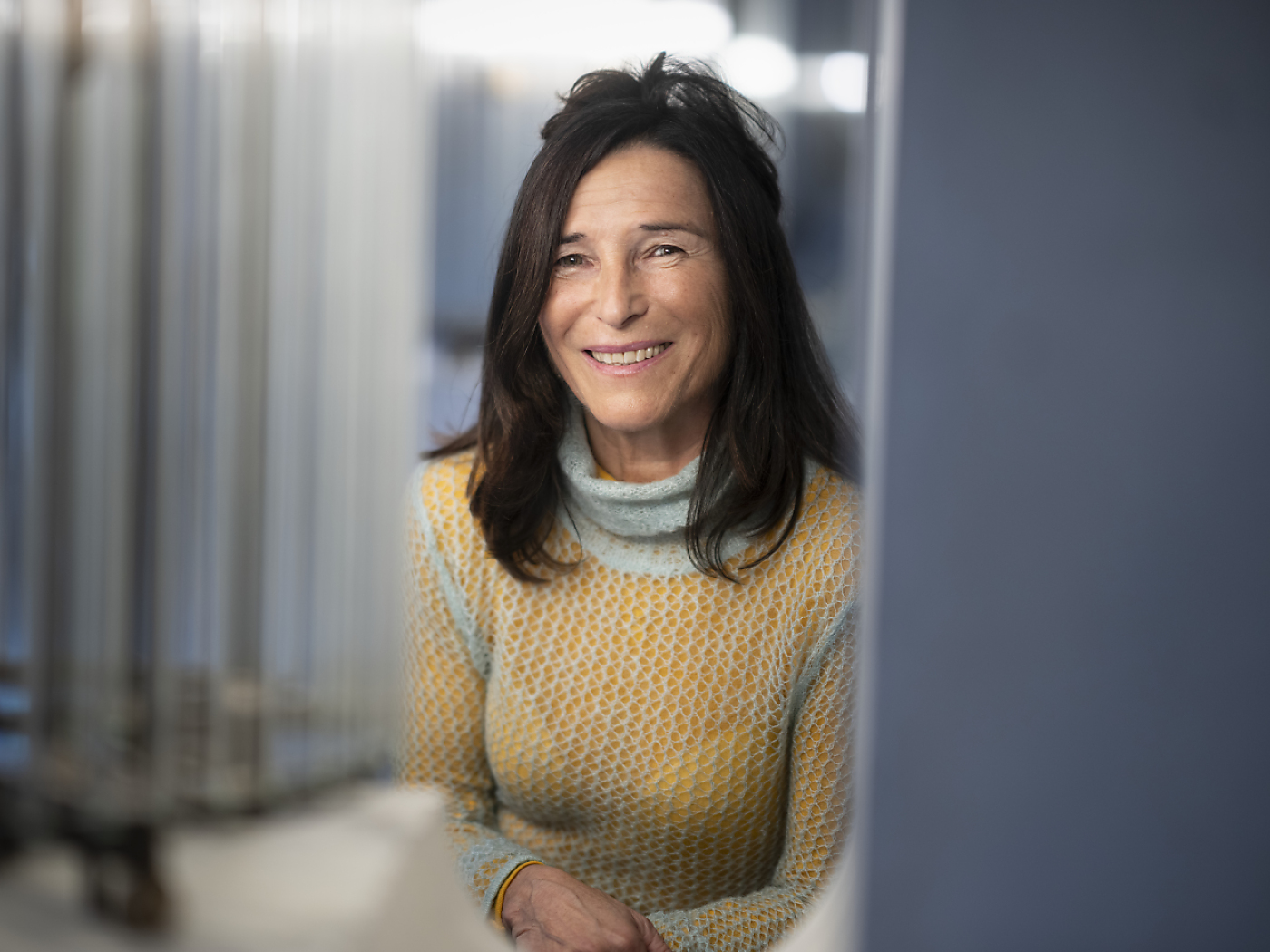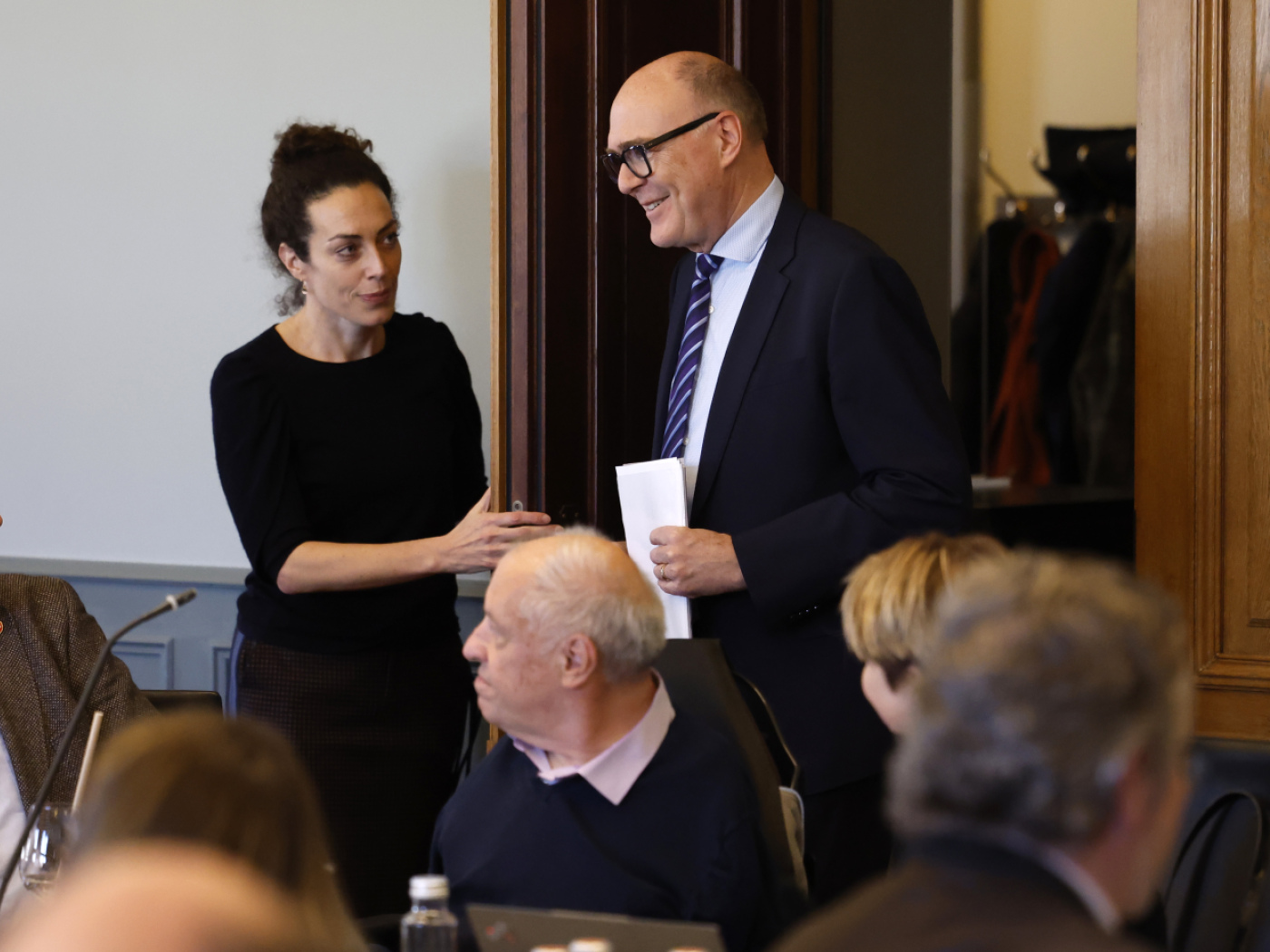Lilo Baur wins Swiss Grand Prix for performing arts

The Swiss actress and theatre-opera director Lilo Baur has received this year's Swiss Grand Prix for Performing Arts, also known as the Hans Reinhart Ring. The prestigious award is endowed with CHF100,000 ($114,000).
+ Get the most important news from Switzerland in your inbox
“Being able to make a living from your passion is a luxury, it’s incredible that it’s possible,” Lilo Baur told the Keystone-SDA news agency.
Whether as an actress or director, the native of canton Aargau works in an improvised manner and puts the body at the centre. This approach is already part of her training. She attended the Jacques Lecoq International Acting School in Paris. The institution is based on physical theatre and improvisation plays a central role.
Observation is essential to Lecoq’s way of working, said Baur. “It is an awakening of the senses, you have to observe and, above all, analyze the body.” When she puts on a play, she involves the actors in the process. “I give the actors keys for access and work out the characters and individual movements with them,” she explained.
L’Avare (The Miser)
One example of this is her production of Molière’s L’Avare (The Miser) at the Comédie-Française in Paris. Baur has been working there regularly since 2010. L’Avare, first produced in 1668 was revived in 2022 to mark the 400th anniversary of the birth of the influential French playwright and actor and will be on the programme for the 2024/25 season.
“When I read the play again, I said to myself: this is so topical.” In Baur’s interpretation, the main character Harpagon is “a Swiss banker after the Second World War who is obsessed with his casket hidden in the garden”, the theatre writes on its website. “I immediately thought of Geneva, because that’s where money from all over the world is kept,” said Baur.
She was born in Muri in canton Aargau in 1958. She made her career mainly abroad, first as an actress and since the turn of the millennium mainly as a director. However, she also continues to stage plays in Switzerland.
From 1998 to 2000, she was a member of the renowned London theatre group Théâtre de Complicité, with whom she received several international awards, including for her leading role in The Three Lives of Lucie Cabrol (1994). The play was also performed in Zurich at the Theaterhaus Gessnerallee.
Direct theatre at the Globe
In London, she also left her mark at the Globe Theatre, with roles in The Honest Whore and The Merchant of Venice (both 1998), or with Peter Brook as Gertrude in Shakespeare’s Hamlet (2002/03).
The Globe is a theatre building from Shakespeare’s time with an open-air stage and, as was customary at the time, close proximity to the audience. “There was always interaction with the audience,” Lilo Baur enthused. “It’s very immediate and direct theater, a bit like commedia dell’arte.”
However, she has also featured in several films, for example in Vollmond (1998) by Fredi Murer. In 2004, she made a cameo appearance in Bridget Jones. She also appeared in the BBC’s Charles Dickens adaptation Bleak House (2005).
The switch from acting to directing was a turning point in Baur’s life. In 2003, she received a request from Greece. She was to work with the theatre director Thomas Moschopoulos.
Since then, she has worked primarily as a director and has staged countless plays, such as Grimm’s Fairy Tales (2009) in Athens, 33 svenimenti (2008) by Chekhov in Rome and Fish Love (2008) based on Chekhov, which was co-produced by the Théâtre de Vidy in Lausanne.
Opera leaves less freedom
In addition to plays, she also directs operas, such as Dido and Aeneas (2011) by the English baroque composer Henri Purcell and the modern work Ariane et Barbe Bleu (2012) by Paul Dukas, both in Dijon. She staged the late romantic Lakmé by Léo Delibes at the Opéra de Lausanne in 2013 and the opera Le Pétit Prince by Michaël Levinas in 2014.
She says opera leaves less freedom. The score dictates the rhythm. But one thing remains the same: “Whether theatre or opera, I always start with improvisations with the actors”. She also often involves dancers, who emphasize the physical and rhythmic dimension of the performance: “I have great respect for the music, I think it is very important and I think it drives the whole stage action.”
Translated from German with DeepL/sb
This news story has been written and carefully fact-checked by an external editorial team. At SWI swissinfo.ch we select the most relevant news for an international audience and use automatic translation tools such as DeepL to translate it into English. Providing you with automatically translated news gives us the time to write more in-depth articles.
If you want to know more about how we work, have a look here, if you want to learn more about how we use technology, click here, and if you have feedback on this news story please write to english@swissinfo.ch.

In compliance with the JTI standards
More: SWI swissinfo.ch certified by the Journalism Trust Initiative


















You can find an overview of ongoing debates with our journalists here . Please join us!
If you want to start a conversation about a topic raised in this article or want to report factual errors, email us at english@swissinfo.ch.